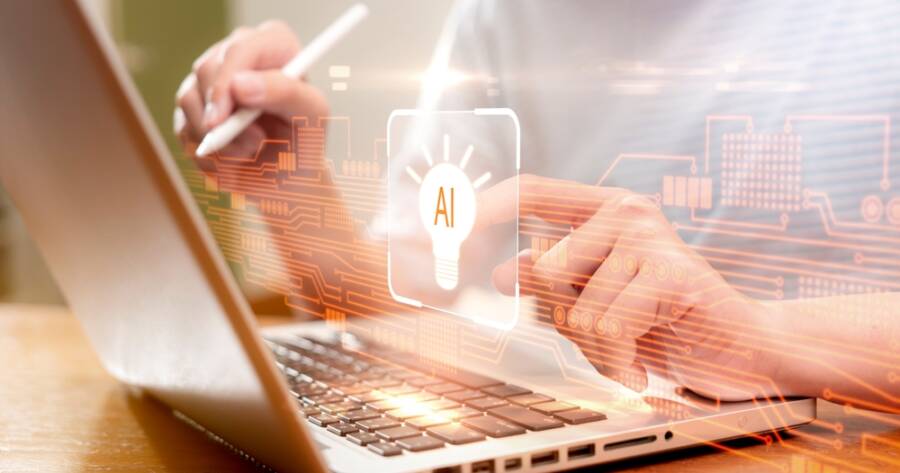In the rapidly evolving world of business, Artificial Intelligence (AI) is increasingly becoming a pivotal player. Companies are continually exploring AI’s potential to enhance efficiency, innovation, and productivity. As AI technologies develop, they could transform traditional work environments by introducing new tools and methodologies.
Transforming Hiring Practices
AI’s influence on hiring practices is already noticeable. By utilizing machine learning algorithms, businesses can streamline recruiting, potentially identifying suitable candidates more effectively than traditional methods.
AI-driven tools might help to eliminate unconscious biases, offering a more equitable hiring process. Despite these advances, questions about the ethical use of AI in recruitment linger, highlighting the need for careful implementation to protect candidate privacy and data security.
Enhancing Workplace Productivity
AI has the potential to redefine productivity. Automation tools aimed at handling repetitive tasks, such as data entry and inventory management, could free employees to focus on more complex and creative responsibilities.
Project management tools powered by AI could offer predictive analytics, assisting teams in making data-driven decisions. However, the integration of AI into daily tasks requires careful consideration to maintain employee morale and trust.
Revolutionizing Customer Service
Customer service is another area where AI is making significant strides. Chatbots and virtual assistants, using natural language processing, might provide instant, personalized customer experiences around the clock.
These tools could gather valuable customer data, offering insights that inform future strategies and innovations. Yet, entirely replacing human interaction with machines poses challenges, as the human touch often remains essential, especially in nuanced or complex situations.
Facilitating Remote Work
AI’s capacity to enhance remote work environments could be transformative. With tools to support virtual collaboration, AI could enable teams to function seamlessly regardless of location. AI-driven platforms may offer real-time analytics on productivity and engagement, allowing managers to adapt strategies to optimize remote work.
As organizations increasingly adopt hybrid work models, the role of AI in facilitating these transitions will likely become more prominent, though not without addressing concerns over employee surveillance and data confidentiality.
Driving Innovation and Creativity
AI can act as a catalyst for innovation by providing new avenues for creativity. From generating design ideas to suggesting strategic business insights, AI’s analytical capabilities potentially lead to breakthroughs in various fields.
Creative algorithms might assist in content creation, augmented by human touch for authenticity and emotional resonance. The blend of human intuition with AI’s precision offers fertile ground for innovation, although defining the balance between human and AI contributions remains a crucial consideration.
Addressing Ethical and Moral Implications
The integration of AI into the workplace brings ethical complexities and moral considerations. Concerns about job displacement and the potential for increased inequality should be addressed thoughtfully. Businesses need to consider transparent practices and provide retraining programs that allow employees to adapt.
Developing ethical AI policies can help organizations to employ AI responsibly, considering both societal impact and organizational goals. The future will likely require balancing technological advancement with humanity’s broader ethical and moral values.
Preparing the Workforce for an AI-driven Future
Education and training are key to preparing the workforce for an AI-integrated future. As AI redefines roles, employees may need to acquire new skill sets, including data literacy and critical thinking. Organizations could invest in lifelong learning initiatives to equip their teams for continuous adaptation.
Building a culture that embraces change and continual learning could be essential to thriving in this evolving landscape. Thematic emphasis on upskilling and reskilling will play a vital role in ensuring that human talent remains invaluable.
The Role of Leadership in AI Integration
Leadership will be crucial in driving successful AI integration within organizations. Leaders must navigate the challenges and opportunities presented by AI, requiring a strategic vision that aligns technology with company values and goals.
Transparent communication and inclusive decision-making processes can help to foster trust and ownership among employees. As AI becomes more embedded in organizational operations, leadership skills aimed at navigating ambiguity and fostering innovation will be particularly important.
Learn More Today!
AI’s potential to reshape the business landscape is vast and multifaceted. From enhancing productivity and facilitating innovation to transforming customer experiences and supporting remote work, AI offers numerous benefits.
However, its integration must be handled with care, addressing ethical considerations and preparing the workforce for inevitable changes. With thoughtful strategies and an emphasis on human-AI collaboration, businesses can harness AI’s potential while ensuring sustainable growth and success in the ever-evolving future of work.

